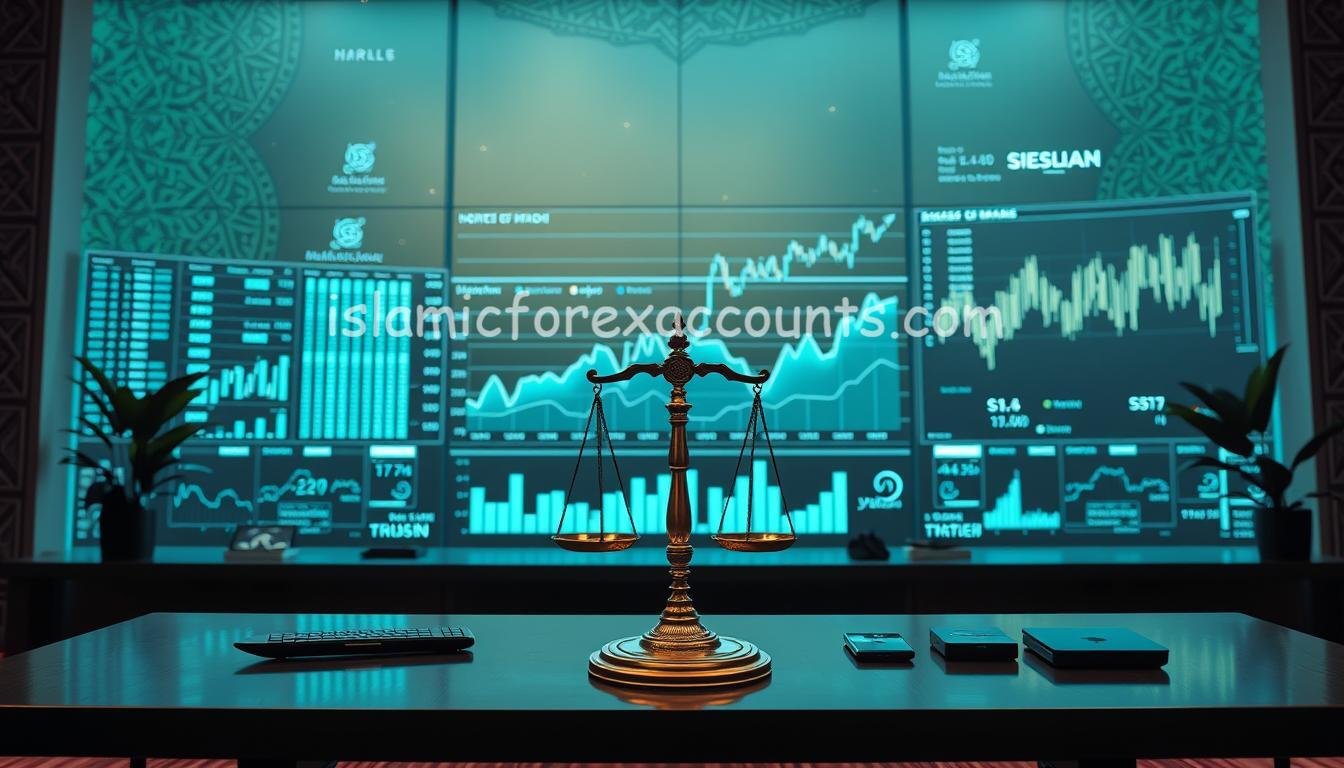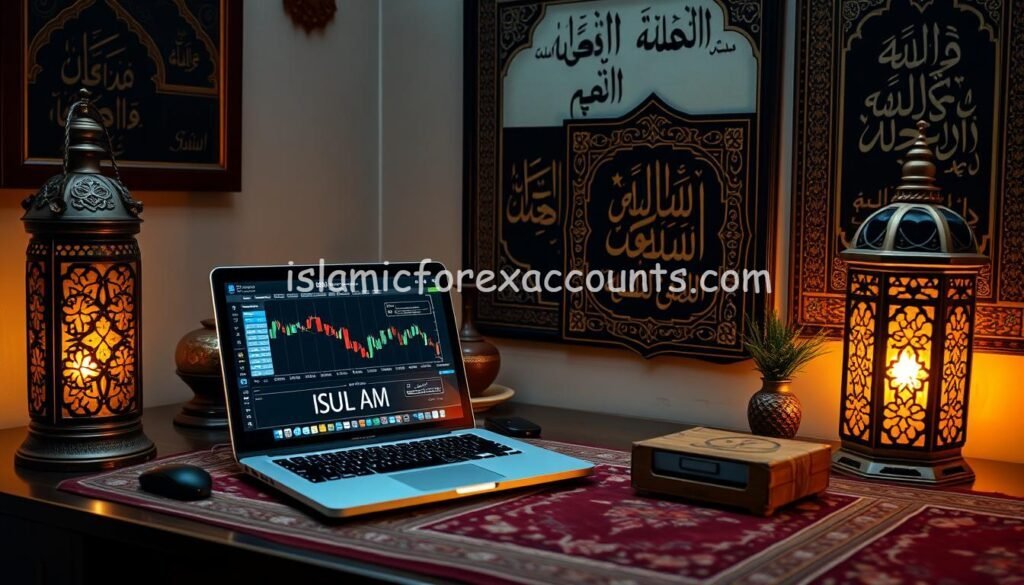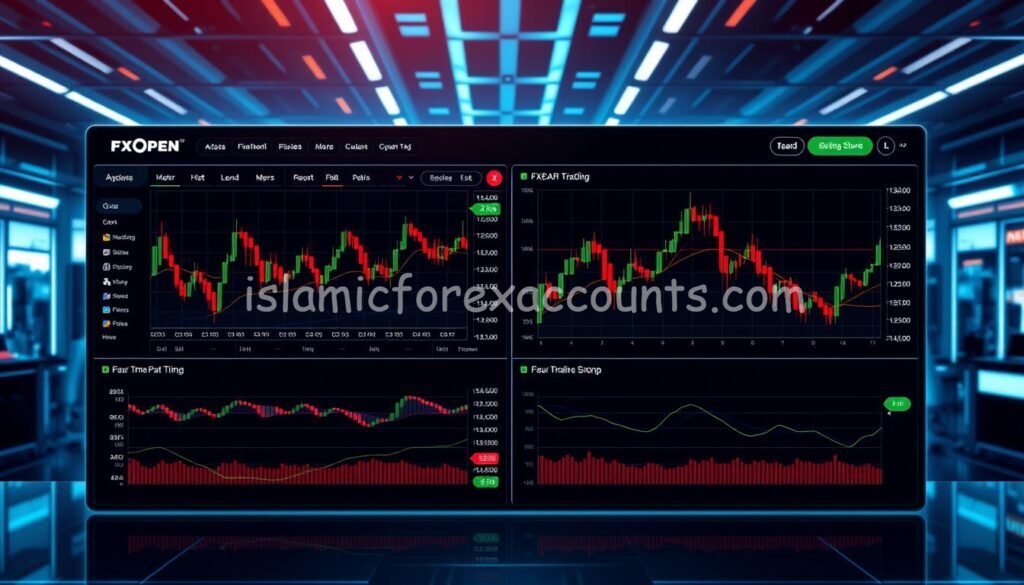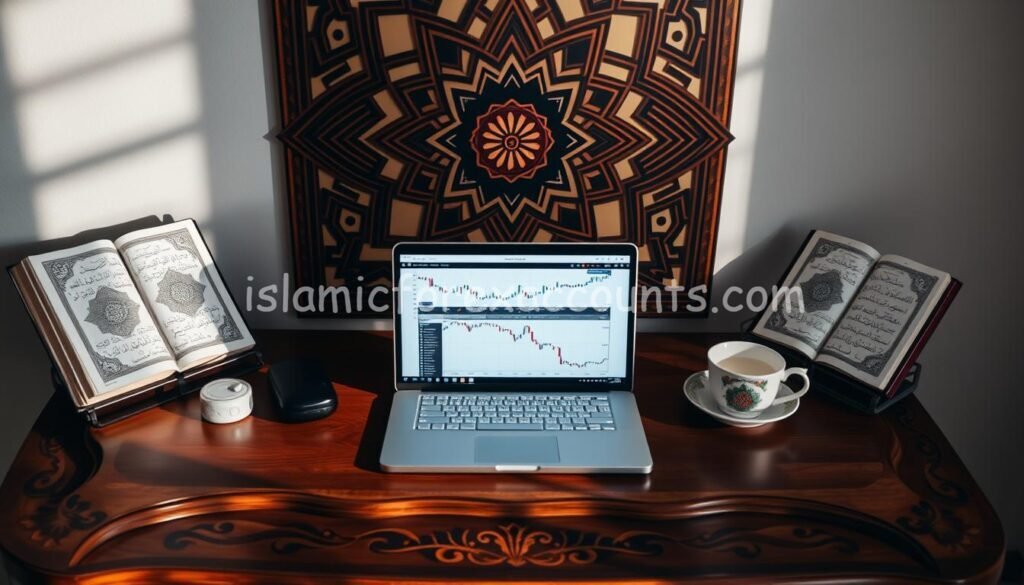Muslim Forex Traders: Halal Trading Strategies
In Kenya, more Muslim forex traders are entering the market. They follow Islamic finance rules while trading. This is because they want to invest in a way that fits their beliefs.
This guide is for Muslim forex traders. It talks about the challenges they face and how they keep their trading halal. You’ll learn about Islamic finance basics and how to pick a sharia-compliant broker. This will help you start your halal forex trading journey.
Key Takeaways
- Understand the fundamental principles of Islamic finance and how they apply to forex trading
- Discover sharia-compliant trading strategies and techniques that adhere to Islamic guidelines
- Learn how to identify and partner with a trusted, sharia-compliant forex broker
- Explore risk management strategies to ensure your trading activities remain halal
- Develop a trading plan that integrates Islamic values and ethical considerations
Understanding Islamic Finance Principles
Islamic finance is guided by key principles. These include not allowing riba (interest) and focusing on risk-sharing and asset-backing.
Prohibition of Riba (Interest)
Sharia law bans the taking or giving of interest (riba). It views riba as unfair, where one person profits at another’s expense. Islamic finance promotes sharing risks and profits, where both sides benefit.
Risk-Sharing and Asset-Backing
- Islamic finance deals with real assets, not just financial products.
- It focuses on risk-sharing, unlike traditional systems where lenders take most of the risk.
- This approach makes finance more fair and ethical, focusing on real economy, not speculation.
Knowing these islamic finance principles helps Muslim forex traders. They can trade in a way that respects their beliefs. This opens up new chances for risk-sharing and asset-backing in forex trading.
How Forex Trading Works within Islamic Guidelines
In the world of halal trading and sharia-compliant investing, the forex market offers great chances for Muslim traders. They can learn forex trading strategies that fit Islamic finance rules. This way, they can join the global currency exchange while staying true to their faith.
Islamic finance bans riba, or interest-based deals. In forex, this means avoiding interest-bearing tools like margin trading. Instead, Muslim traders can use swap-free or Islamic accounts. These options remove the interest part.
Islamic finance also values risk-sharing and asset-backing. In forex, this means choosing strategies that focus on real economic actions and asset-based deals. Spot trading and forward contracts are good examples. They involve exchanging currencies at the current rate or at a set future date.
“Forex trading, when done in accordance with Islamic finance guidelines, can be a viable investment option for Muslim traders, allowing them to participate in the global currency markets while upholding their religious principles.”
By following Sharia-compliant rules, Muslim traders can move through the currency markets while keeping their faith and values. This requires knowing both the forex market and Islamic finance well. But, the benefits can be big for those who manage to connect these two areas.
Choosing a Sharia-Compliant Forex Broker
For Muslim forex traders, picking a broker that follows Islamic finance rules is key. Sharia-compliant forex brokers provide special services and account types for Islamic investors. It’s important to consider several factors when choosing a broker.
Evaluating Broker Credentials
Find forex brokers certified as Sharia-compliant by trusted Islamic finance bodies. This means their operations and services meet Islamic law standards. Also, check their reputation, customer feedback, and regulatory status to ensure they are transparent and ethical.
Islamic Account Options
Sharia-compliant forex brokers offer islamic trading accounts without interest. These accounts might have swap-free trading and profit-and-loss sharing instead of fixed spreads. Look into different sharia-compliant forex broker options to find the best fit for your trading style and goals.
Choosing a Sharia-compliant forex broker allows Muslim traders to use islamic trading accounts that respect their beliefs. This way, they can trade in a way that is both halal and potentially opens up new opportunities in the global forex market.
Halal Trading Strategies for Muslim Forex Traders
Muslim traders in the forex market need strategies that fit Islamic finance. They can use fundamental and technical analysis.
Fundamental Analysis
Fundamental analysis looks at economic, political, and social factors affecting currency rates. By studying data like GDP, inflation, and interest rates, traders can spot good opportunities. This method helps traders follow Islamic finance, focusing on risk-sharing and asset-backed deals.
Technical Analysis Techniques
Technical analysis is also key for Muslim traders. Tools like moving averages and Fibonacci retracements help analyze market trends. These tools let traders make decisions that are both informed and in line with Islamic finance.
| Halal Trading Strategies | Description |
|---|---|
| Fundamental Analysis | Examining macroeconomic factors to identify trading opportunities |
| Technical Analysis | Utilizing tools like moving averages and candlestick patterns to analyze market trends |
By mixing fundamental and technical analysis, Muslim traders get a full view of the market. They can then make decisions that are both halal and in line with their goals.
“Successful halal trading requires a deep understanding of both Islamic finance principles and effective trading strategies.”
Risk Management for Halal Trading
For Muslim forex traders, having a strong risk management plan is key. It keeps your money safe and makes sure you follow Sharia law. A big part of this is position sizing. It’s about figuring out the right trade size based on how much money you have and how much risk you can take.
Position Sizing Strategies
In halal trading, how you size your positions is very important. It helps control how much risk you take on. Here are some ways to size your positions well:
- Fixed Percentage Method: Set a fixed percentage of your account for each trade, usually 1% to 5%. This keeps your risk the same for all trades.
- Risk-Based Position Sizing: Figure out the max risk per trade based on your stop-loss and account size. This makes sure you don’t risk too much on one trade.
- Volatility-Adjusted Position Sizing: Change your position sizes based on the currency pair’s volatility. If it’s high, use smaller sizes to manage risk better.
It’s important to pick a strategy that fits your risk level and trading goals. And it must follow Sharia-compliant finance rules.
“Proper risk management is the foundation of successful halal trading. It’s not just about the returns, but the preservation of your capital in a way that pleases Allah.”
By using good risk management and smart position sizing, Muslim forex traders can trade with confidence. They make sure their trading stays true to Islamic financial rules.
Developing a Trading Plan
As Muslim forex traders, having a solid trading plan is key. It should match your financial goals and how much risk you can take. Your plan is like a map, helping you navigate the market and make informed choices.
Defining Goals and Risk Tolerance
Start by setting clear trading goals. Do you want steady profits, to grow your wealth over time, or both? Having specific, measurable goals helps you stay focused and track your success.
Understanding your risk tolerance is also vital. How much risk are you okay with to reach your trading goals? This will shape your trading size, leverage, and approach, keeping it Sharia-compliant.
| Goal-Setting | Risk Tolerance |
|---|---|
|
|
By carefully setting your trading goals and risk tolerance, you can craft a trading plan. This plan will guide your halal forex trading, aligning with your values and goals.

Islamic Trading Psychology
The world of trading can be tough and emotional, especially for Muslim forex traders. They face the challenge of following their religious values while trading. The trading psychology part of their journey is very important.
Islamic finance is based on risk-sharing and asset-backing. These principles might not always fit with the fast and speculative nature of forex trading. Muslim traders need to balance making money and staying true to their Islamic values.
It’s key for Muslim forex traders to have a healthy and disciplined mindset. They should be patient, control their emotions, and think long-term. This approach aligns with Islamic finance’s values.
“In the spirit of Islamic finance, the ultimate goal is not to maximize profits, but to engage in economic activities that are beneficial to society as a whole.”
By using trading psychology based on Islamic principles, Muslim forex traders can trade with confidence and faith. This approach makes trading more meaningful and contributes to financial inclusion and social responsibility.
Forex Education and Learning Resources
As a Muslim forex trader, it’s key to keep learning and growing. Whether you’re new or have lots of experience, there’s a lot to learn. Many resources are out there to help you get better at trading.
Online Courses and Webinars
The internet has changed how we learn, and forex education is no different. Many online forex education sites offer courses for all levels. You can learn at your own speed, whenever you want.
Also, webinars are a big deal in forex. Experts and brokers share market news, trading tips, and how to manage risks. These live sessions are interactive and can give you fresh insights.
Books and Blogs
If you like books, there are many trading books to choose from. They cover everything from basic analysis to complex finance topics. They offer deep advice from seasoned traders.
Online, there are also many trading blogs. These sites share market analysis, trading advice, and personal stories. They can motivate and teach you a lot about trading.
“Continuous learning is the minimum requirement for success in the forex market.”
Navigating Swap-Free Accounts
For Muslim forex traders, dealing with interest (riba) is a big challenge. Traditional trading accounts often have interest, which is not allowed in Islamic finance. But, swap-free accounts offer a Sharia-compliant way for Muslim traders to join the forex market without breaking their religious rules.
Swap-free accounts, or Islamic trading accounts, remove interest from forex deals. They let traders open and close positions without overnight fees or interest. This keeps trading in line with Islamic finance rules.
| Feature | Swap-Free Accounts | Traditional Accounts |
|---|---|---|
| Overnight Financing Charges | No | Yes |
| Interest-based Fees | No | Yes |
| Sharia Compliance | Yes | No |
Using swap-free accounts, Muslim forex traders can trade while following Islamic finance rules. This lets them join the global financial world without going against their faith.
“Swap-free accounts have been a game-changer for Muslim traders, allowing them to navigate the forex market in a way that aligns with their faith.”
For Muslim traders in the forex market, knowing about swap-free accounts is key. These accounts help them trade currencies while sticking to Islamic finance rules. This opens up new chances for halal investing and growing wealth.
Building a Supportive Trading Community
As a Muslim forex trader in Kenya, finding a supportive community is key. Joining a trading group can offer guidance, advice, and camaraderie. This can empower your trading journey.
Being part of a trading community lets you learn from others. Seasoned Muslim traders share their insights on Sharia-compliant trading. They offer practical strategies and solutions to common challenges.
- Connect with fellow Muslim traders to discuss halal trading techniques and share best practices.
- Participate in online forums or social media groups dedicated to Islamic finance and forex trading.
- Attend virtual or in-person events, workshops, and conferences to network with the Muslim trading community.
Building relationships with like-minded traders creates a supportive ecosystem. This ecosystem fosters mutual growth and understanding. It’s especially valuable for Muslim traders in Kenya, where the trading landscape may not always meet their needs.
“When you surround yourself with a community of traders who share your values and goals, you unlock a wealth of knowledge and support that can truly transform your trading experience.”
Engaging with a trading community gives you a sense of belonging and connection. This is crucial for Muslim traders who may feel isolated or misunderstood. By connecting with others who share your beliefs, you find a safe space to discuss your concerns and celebrate your successes.
So, whether you’re a seasoned trader or just starting, explore the vibrant trading community of Muslim forex traders in Kenya. Building these connections can unlock a world of support, knowledge, and camaraderie. This can elevate your trading to new heights.
Staying Compliant with Halal Trading
As Muslim forex traders, we must always follow Islamic finance rules. It’s important to check our trading often to make sure it’s halal. This means looking for any problems or things that don’t follow Islamic trading rules.
Monitoring Account Activity
Keeping an eye on your account is key for halal traders. You need to watch your trades and account closely. This ensures your trading follows Islamic rules. Here are some tips for good account monitoring:
- Check your trading history and transactions often to spot any issues.
- Look over your broker’s reports to make sure your trading is correct.
- Keep up with new Islamic finance rules and talk to experts to make sure your trading is okay.
- Use strong risk management to avoid any problems with Islamic rules.
By watching your account closely, Muslim forex traders can keep their trading halal. This helps them follow Islamic rules and stay true to their faith.
| Key Considerations for Halal Account Monitoring | Best Practices |
|---|---|
| Riba (Interest) Avoidance | Check all transactions and positions for any interest. |
| Sharia-Compliant Broker Verification | Look at broker statements and reports to make sure they follow Islamic finance. |
| Risk Management Protocols | Use strong risk management to avoid any Islamic rule problems. |
| Consultation with Islamic Finance Experts | Stay updated on Islamic finance rules and get advice from experts. |
By watching their accounts and following Islamic rules, Muslim forex traders can keep their trading true to their faith. This makes sure their trading is halal and follows Islamic principles.
Integrating Islamic Values into Trading
As Muslim forex traders, we have a special chance to follow Sharia law and Islamic faith in our trading. We can make our trading not just about money but also about our faith. This way, our trading journey can be both rewarding and spiritually enriching.
The idea of risk-sharing and asset-backing is key in Islamic trading. We avoid using too much debt and focus on owning real assets. This follows Islamic rules against riba (interest) and promotes a fair, sustainable trading approach.
Islamic finance also values transparency and fairness. As traders, we aim to be honest, act with integrity, and care for society. This means we avoid tricks, share important info, and make choices that benefit everyone.
“The true believer is the one who is honest and trustworthy, and the best of you are those who are the best in conduct and character.” – Prophet Muhammad (peace be upon him)
By applying these Islamic values, we can succeed in trading and improve the financial world. This way, our trading is not just about making money but also about doing good. It helps us find purpose and fulfillment in our financial journey.

| Islamic Value | Trading Application |
|---|---|
| Risk-Sharing and Asset-Backing | Prioritize trading strategies that emphasize real asset ownership and equitable profit-and-loss sharing, avoiding excessive leverage and speculation. |
| Transparency and Fairness | Conduct market activities with honesty, integrity, and a commitment to social responsibility, avoiding manipulative practices and disclosing relevant information. |
| Ethical Conduct and Character | Cultivate a trading mindset that is grounded in Islamic ethical values, fostering a sense of purpose and fulfillment in the pursuit of financial prosperity. |
Leveraging Technology for Halal Trading
Technology has changed the game in forex trading, especially for Muslim traders. It helps them follow Sharia-compliant practices. New tools and platforms have made halal trading easier, opening doors for Muslim forex fans.
Swap-free or Islamic forex accounts are a big step forward. They remove riba (interest), which is not allowed in Islamic finance. This lets Muslim traders join the forex market without breaking their faith. They can use Sharia-compliant platforms to trade ethically and faithfully.
Technology also offers advanced trading tools and analytics for Muslim traders. There’s charting software, automated trading, and market research platforms. These help traders make smart, Sharia-compliant choices.
Online learning resources like videos, webinars, and simulations are also available. They help Muslim traders improve their skills in halal trading. With these tools, traders can keep up with market trends and changes.
As technology grows, Muslim forex traders will see more solutions tailored to them. Using these tools, they can trade confidently, staying true to their Islamic values.
“The integration of technology and halal trading practices has opened up a world of opportunities for Muslim forex traders, empowering them to participate in the global financial markets while upholding their religious and ethical values.”
Conclusion
We’ve looked into the world of Muslim forex trading in Kenya. We showed how traders can follow their Islamic values in the forex market. They do this by sticking to sharia-compliant investing rules.
These rules include not taking interest and focusing on risk-sharing and asset-backing. This way, Muslim traders can trade in a way that fits their beliefs.
In this guide, we’ve also talked about the strategies and tools for Muslim forex traders. We’ve given them the tools to make smart choices and follow halal trading paths. This includes picking the right broker and using technology for safe and clear transactions.
For Muslim traders in Kenya, there are many ways to succeed in the forex market. They can use fundamental analysis, technical analysis, or a solid trading plan. With the right knowledge and resources, they can trade ethically and reach their goals.
FAQ
What are the key principles of Islamic finance that impact forex trading?
Islamic finance bans riba (interest) and focuses on risk-sharing and asset-backing. Muslim traders must avoid interest and use trading strategies that follow Sharia law.
How can Muslim forex traders participate in the forex market while adhering to Islamic guidelines?
Muslim traders can use Sharia-compliant strategies like spot trading and forward contracts. They can also use swap-free accounts to avoid interest.
What factors should Muslim traders consider when choosing a Sharia-compliant forex broker?
Muslim traders should check the broker’s credentials and if they offer Islamic accounts. They should also make sure the broker’s services comply with Sharia law.
What are some halal trading strategies that Muslim forex traders can utilize?
Muslim traders can use fundamental analysis and technical analysis that doesn’t involve interest. These methods help them follow Islamic finance principles.
How can Muslim forex traders effectively manage risk in their trading activities?
Muslim traders can manage risk by using proper position sizing and stop-loss orders. Diversification also helps protect capital and follow Islamic finance principles.
What educational resources are available to help Muslim forex traders improve their skills and knowledge?
There are many educational resources for Muslim traders. These include online courses, webinars, books, and blogs focused on Sharia-compliant trading.
How can Muslim forex traders build a supportive trading community?
Muslim traders can join or create communities for support and camaraderie. These communities help traders stay motivated and share knowledge on halal trading.
What are the key considerations for maintaining Sharia compliance in forex trading?
Muslim traders must monitor their accounts and avoid prohibited practices. They should align their trading with Islamic finance principles to stay compliant.




























